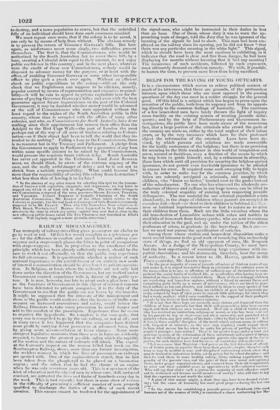RAILWAY M ISMANAG EM ENT.
THE monopoly of railway-travelling gives relsF.engers no choice to go by road or rail. Of this few would complain as a grievance per
se ; for the difference in comfort and speed between railway con- veyance and a stage-coach places the latter in point of comparison with stage-waggons. But in proportion to the excellence of the principle, which has been already sufficiently tested, should be the care to work it out effectually, so that the public may experience its full advantages. It is questionable whether a matter of such national importance as the establishment of an entirely new mode of internal communication should be ahaoloned to private specula- tion. In Belgium, at least, where the railroads are not only laid dovt n under the direction of the Government, but are worked under
Government control, experience tells in favour of the public sys- tem. It is now, however, too late to adopt such a plan here : but
as the functions of Government in this object of national concern have been delegated to private companies, it is the duty of the Government to see that the public are not losers by the transfer. It might be supposed that the interests of the management and
those of the public would coalesce; that the increase of traffic con- sequent on increased convenience and safety, would induce the
Railway Directors to take every precaution to avoid danger and
add to the comfort of the passengers. Experience thus far scums to negative the hypothesis. So complete is the monopoly, that
every one is compelled to go by the ene railway, or not at all ; and in many cases it has happened that the companies have derived more profit by carrying feeer passengers at advanced fares, than
by giving more accommodation at lower charges. Sonic more stringent legislative measures than those now in farce are evidently required, to insure the greatest possible safety which the rapidity of the motion and the nature of railroads will admit. The expos at the Coroner's inquest on the woman killed last week on the Southampton Railway, shows, more that, any former investigetion,
the reckless manner in which the lives of' passeegers on railways are sported with. One of the engine-drivers stated, that he had
been taken from the plot igh-tail to be placed on a locomotive engine ; and the other, that he had the charge of an engine when he was only seventeen years old. This is it specimen of the
kind of education awl the chola of' men to whose care, skill, and good
conduct, are intrusted the liveS and limbs of h undreds every day in the week. This is bad enough ; but there is some show of excuse in the difficulty of' procuring a sufficient number of filen properly qualified to discharge the filakff a an office of such recent creation. This excuse cannot be tendered for the appointment of
the signal-men, who might be instructed in their duties in less than an hour. One of these, whose duty it was to warn the ap- proaching train of danger, told the Jury that he was ignorant of the meaning of the signals he had to show. This man had been em- ployed on the railway since its opening, yet he did not kuow " that there was any particular meaning in the white light." This signal, which he should have been the most cautious in exhibiting, as it indicates that the road is clear and free from danger, he had been displaying for months without knowing that it had any meaning ! The recurrence of such accidents, followed by such exposures, must ultimately demand an efficient remedy. We wish, if possible, to hasten the time, to prevent more lives from being sacrificed.


























 Previous page
Previous page